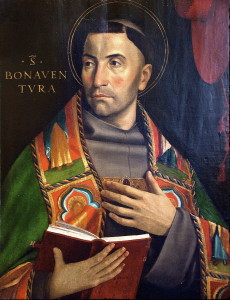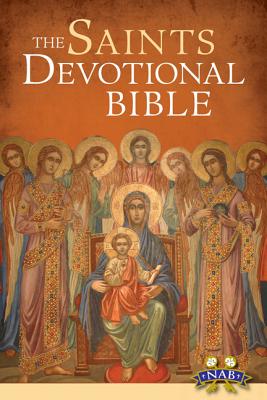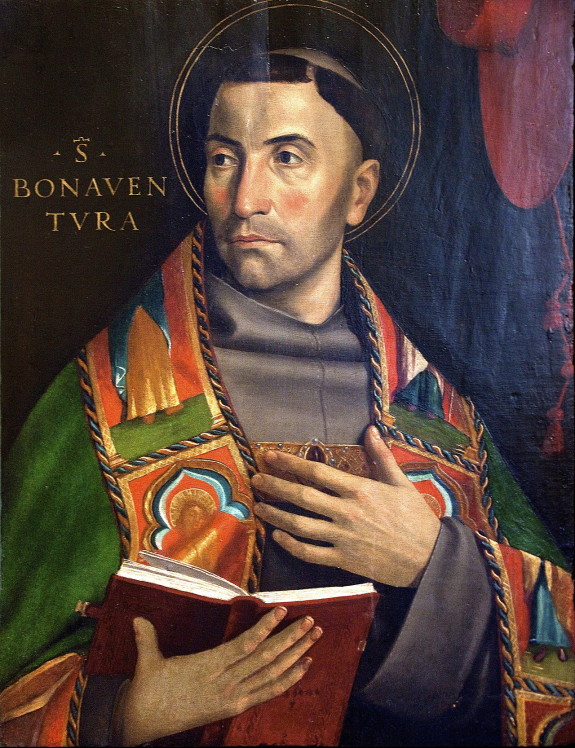Today we continue our regular series called “Learning from the Saints.” Our guide is expert Bert Ghezzi, a dear friend of mine and the author of numerous books including Voices of the Saints, Saints at Heart, and Discover Christ: Developing a Personal Relationship with Jesus.
His newest book is The Saints Devotional Bible, which illuminates the Scriptures with the saints’ own reflections. You can learn more about Bert and his work at BertGhezzi.com.
Today, Bert profiles St. Bonaventure, a thirteenth century bishop and Doctor of the Church.
From 1248 to 1257, St. Bonaventure taught Scripture and theology at the Franciscan school at Paris. His teaching and writing there established him as a leading scholastic theologian. Bonaventure’s books about Christian realities dispel the false contemporary opinion that medieval theologians were dry-as-dust rationalists who wasted time counting angels on the heads of pins. In this excerpt from The Tree of Life, Bonaventure lyrically urges the soul to seek God:
“You soul devoted to God,
whoever you are, run
with living desire
to this Fountain of life and light
and with the innermost power of your heart
cry out to him:
‘O inaccessible beauty of the most high God
and the pure brightness of the eternal light,
life vivifying all life,
light illumining every light,
and keeping in perpetual splendor
a thousand times a thousand lights
brilliantly shining
before the throne of your divinity
since the primeval dawn!
O eternal and inaccessible,
clear and sweet stream from the fountain
hidden from the eyes of all mortals,
whose depth is without bottom,
whose height is without limit,
whose breadth cannot be bounded,
whose purity cannot be disturbed.
From this Fountain
flows the stream of the oil of gladness,
which gladdens the city of God,
and the powerful fiery torrent,
the torrent, I say, of the pleasure of God,
from which the guest at the heavenly banquet
drink to joyful inebriation
and sing without ceasing
hymns of jubilation.
Anoint us
with this sacred oil and refresh
with the longed-for waters of this torrent
the thirsting throat of our parched hearts
so that amid shouts of joy and thanksgiving
we may sing to you
a canticle of praise,
proving by experience that
with you is the fountain of life,
and in your light we will see
light (see Ps 36:10).”
 After 1257 as Master-General of the Franciscans, Bonaventure governed the friars gently, but firmly. He reorganized the order whose numbers had increased enormously, and he renewed the friars’ zeal. However, Bonaventure could not resolve the dissension between rigorists who put poverty above all and moderates who wanted a less severe rule. His insistence on serious study departed from St. Francis’s teaching and required the possession of buildings and books. He saw the friars mission as preaching and giving spiritual direction, complementing the work of parish priests who often were not skilled in these things.
After 1257 as Master-General of the Franciscans, Bonaventure governed the friars gently, but firmly. He reorganized the order whose numbers had increased enormously, and he renewed the friars’ zeal. However, Bonaventure could not resolve the dissension between rigorists who put poverty above all and moderates who wanted a less severe rule. His insistence on serious study departed from St. Francis’s teaching and required the possession of buildings and books. He saw the friars mission as preaching and giving spiritual direction, complementing the work of parish priests who often were not skilled in these things.
In 1273, Pope Gregory X appointed Bonaventure cardinal-bishop of Albano. His legates came bearing the red hat and other symbols of office only to find Bonaventure washing the dishes. The saint told his visitors to hang the hat on a tree and wait in the garden until he was finished with his task. “A constant fidelity in small things,” he once wrote, “is a great and heroic virtue.”
The pope summoned Bonaventure to Rome, charging him to prepare for the Council at Lyon that he had called to restore unity with the Greek Church. In 1274, Bonaventure played a major role at the meeting, even addressing the assembly in Greek, and the delegates agreed on reunion. Bonaventure preached at the Mass of reconciliation. The saint must have felt exhilarated at making peace in the Church. But he died shortly afterward, not surviving long enough to see his work dashed when Constantinople repudiated the reunion.
“No one can be made happy unless he rise above himself,
not by an ascent of the body, but of the heart.
But we cannot rise above ourselves
unless a higher power lifts us up.
And divine aid is available
to those who seek it from their hearts,
humbly and devoutly.”— St. Bonaventure
(Image Credit: Bonaventure)
Read more from Bert at his website www.BertGhezzi.com, or check out his many books on Amazon.
 |
 |
 |
 |


